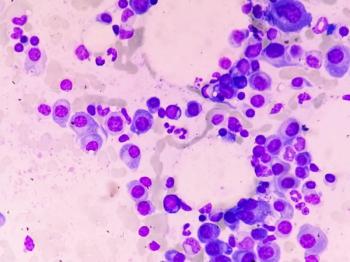
A new KFF poll found that 55% of adults use social media to find health information, with most of this group comprising young adults and those of Black and Hispanic descent.

A new KFF poll found that 55% of adults use social media to find health information, with most of this group comprising young adults and those of Black and Hispanic descent.

Elise S. Tremblay, MD, MPH, discusses her study on trends in insulin out-of-pocket costs and use disparities from 2008 to 2021, highlighting how health plan structure and income level influenced access and adherence.

A new report from the CDC shows that about 62% of children’s and teens’ diets are made up of ultra-processed foods.

Chronic spontaneous urticaria places a heavier burden on patients than atopic dermatitis and psoriasis, leading to a worse quality of life and higher health care costs, underscoring the critical need for better treatments.

A new American Heart Association initiative is working to increase screening for lipoprotein(a) (Lp[a]) at community health centers nationwide to help address undetected cardiovascular risk.

A new model was linked to decreased BMI, caloric intake, and loss of control eating in veterans with binge eating disorders or subjective binge eating episodes.

A new report from Bluesight reveals how automation and analytics are helping hospital pharmacy teams cut spending, manage shortages, and streamline procurement.

Results confirm previous findings that nonarteritic anterior ischemic optic neuropathy (NAION) was more likely in those who used semaglutide, a glucagon-like peptide-1 receptor agonist (GLP-1 RA).

Bevacizumab combined with chemotherapy was not as effective in advanced driver gene-negative nonsquamous non–small cell lung cancer (NSCLC) compared with immune checkpoint inhibitors plus chemotherapy.

Robert F. Kennedy Jr halted 22 mRNA vaccine initiatives, drawing criticism from health experts over pandemic preparedness concerns.

Fear of progression is common among patients living with chronic diseases, but the degree to which it interferes with patient outcomes, including treatment adherence, deserves further investigation, study authors note.

Higher social vulnerability in patients with ovarian cancer leads to longer treatment delays but earlier palliative care consultations, highlighting critical health disparities.

A study finds 70 years may be a key cutoff for oxaliplatin benefit in stage III colorectal cancer, with no survival advantage seen in older patients or those with stage II disease.

Personalized expert instruction informed by artificial intelligence (AI) data improved surgical performance and skill transfer more effectively than AI feedback alone in a randomized trial.

As the demand for mental health care grows, calls for restructuring what some consider a broken system are louder than ever, with overburdened providers and patients' needs constantly evolving.

Explore how integrated social services enhance health equity, as demonstrated by The Camden Coalition's innovative approaches to patient care and support.

Patients with extramedullary disease had inferior progression-free survival.

From alveolar injury to extracellular matrix accumulation, the complex biology of pulmonary fibrosis is being unraveled alongside explorations of both Western and traditional Chinese therapies.

Explore innovative strategies to enhance heart failure treatment through guideline-directed medical therapy, remote monitoring, and artificial intelligence–driven solutions for better patient outcomes.

A national poll found the majority of Americans believe hospitals should neither sell nor profit from fast food, with strong support for healthier food environments in medical settings.

The Pennsylvania Act 1 of 2023 eligibility criteria for supplemental screenings based on breast density and lifetime risk of breast cancer disproportionately disqualify Black women from supplemental screenings despite their high risk of aggressive cancer and persistent history of false-negative mammograms.

Researchers discovered a significant negative correlation between an individual's oxidative balance score and systemic immune-inflammation index, highlighting the role of antioxidants in reducing inflammation.

In this second part of his interview with The American Journal of Managed Care®, Sanjay Doddamani, MD, MBA, a former senior advisor to CMMI and founder and CEO of Guidehealth, continues a dialogue on the future of value-based care and the promise—and limits—of AI-enabled innovation, reflecting on challenges like rising Medicare costs and patients’ growing financial burdens.

Clearer information on fertility, heredity, and medication use is necessary during family planning for patients with psoriasis.

The efficacy and safety of both approved and investigational drugs for moderate to severe hidradenitis suppurativa offer valuable evidence to guide clinical decision-making in a field where head-to-head trials are largely absent.

Patients with HIV had lower adherence to pre-exposure prophylaxis (PrEP) if they lived in areas with the lowest disadvantage.

In this subanalysis of data from the ADjoin trial of lebrikizumab, the interleukin-13 receptor inhibitor that is also a monoclonal antibody showed itself to be effective over the long term in patients with atopic dermatitis on maintenance therapy.

Residents in historically redlined grade D areas were 1.67 times more likely to have no rapid access to EMS than in grade A areas, increasing their hazard risk of injury-related morbidity and mortality.

An inverse association between Alzheimer disease special care units in nursing homes and the percentage of Black residents within a facility was seen in a new study, but states with higher Medicaid payment-to-cost ratios did not show the same association.

Adults with type 2 diabetes, especially those in vulnerable groups, face higher risks of medical debt, low credit scores, and bankruptcy.

259 Prospect Plains Rd, Bldg H
Cranbury, NJ 08512
© 2025 MJH Life Sciences®
All rights reserved.
